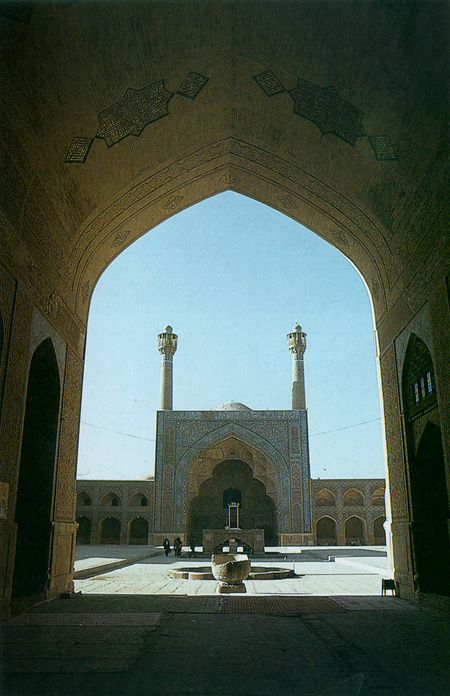 |
The Magic of Andalusia:
February 16 R Maria Rosa Menocal, The Ornament of the World, xi-100
February 21 T Maria Rosa Menocal, The Ornament of the World, 101-200
February 23 R Maria Rosa Menocal, The Ornament of the World, 201-298
|
 |
Core Culture: Middle East
Instructor: Omid Safi
email: Osafi at mail.colgate.edu
office number: (315) 228-7690
110 Hascall Hall
Class times: Tuesday and Thursdays, 9:55 to 11:10, 2nd floor Alumni.
This course is a multi-disciplinary introduction both to the region conventionally referred to as the Middle East, and also to the academic discipline of Middle Eastern Studies. In other words, it is as much a study of the people, region, religion, history, and culture of the region as it is about the politics of studying that region. One of the presuppositions that I have in this course is that a careful, rigorous, and critical study of cultural studies can help one understand one's own assumptions, presuppositions, etc.
This course is far more rigorous than many of the core culture courses. That is reflected in both the quantity and the level of the assigned readings. Furthermore, the entire method of evaluation is based on a communal discussion of the readings. In short, your performance in this course will depend on completing the readings, and being prepared to discuss and analyze them verbally in class. The requirements are spelled out below the syllabus.
One of the main assertions of this course is that the history of the Middle East region (Nile to Oxus, to recall the great historian Marshall Hodgson) has been shaped by three massive events over the course of the last 1500 years:
1) The Rise and Expansion of the Islamic civilization in the 7th century and beyond
2) The migration of Central Asian Turkic tribes onto the Iranian plateau and Arab lands in the 1000-1500 time period
3) The impact of European colonialism, and the subsequent rise of nationalism, post-colonial revolts, etc. over the course of the last two hundred years.
Each of the above components will be treated in some depth.
Required texts:
Ahmed, Women and Gender in Islam
Hourani, History of the Arab Peoples
Maaolouf, Crusades Through Arab Eyes
Menocal, Ornament of the World
Qureshi and Sells, The New Crusades
Safi, The Politics of Knowledge in Premodern Islam
Said (Bayoumi and Rubin, editors) Edward Said Reader
Schimmel, I am Wind, You are Fire
First Day: Special schedule for 20 minute meetings for all classes.
is Monday, January 23
January 24 Tuesday *Orientalism Video in the Class (30 minutes)
January 26 R *Hourani, Part I (seventh to tenth century)
January 31 T *Hourani Part II (chapters 5, 6, 7, 8)
February 2 R *Hourani Part II (Chapter 9, 10, 11, 12)
February 7 T *Leila Ahmed, Women and Gender in Islam, 1-101
February 9 R
*Leila
Ahmed,
Women and Gender in Islam, 102-168
February 14 T *Leila Ahmed, Women and Gender in Islam, 169-248
 |
The Magic of Andalusia:
February 16 R Maria Rosa Menocal, The Ornament of the World, xi-100
February 21 T Maria Rosa Menocal, The Ornament of the World, 101-200
February 23 R Maria Rosa Menocal, The Ornament of the World, 201-298
|
 |
February 28 T Maaolouf, Crusades Through Arab Eyes [the first 80-90 pages]
March 2
R
Maaolouf, Crusades Through Arab Eyes
[poges 90-180]
watch documentary: Islam: Empire of Faith (section on Crusades,
Baghdad)
March 7 T Maaolouf, Crusades Through Arab Eyes [finish the book]
March 11-19 Saturday – Sunday Mid Term Recess
 |
Religion and Politics in Premodern Islam:
Orthodoxy, and contestation in a formative age: |
|
March 9 R start reading in:
Safi,
The Politics of Knowledge in
Premodern Islam,
March 21
T
Safi,
The Politics of Knowledge in
Premodern Islam, 82-124.
March 23 R Safi, The Politics of Knowledge in Premodern Islam, 125-208. |
March 28 T Schimmel, I am Wind, You are Fire [first half of the book]
March 30 R Schimmel, I am Wind, You are Fire [second half of the book]
 |
April 4 T Hourani, Part III (The Ottoman Age)
April 6
R
Hourani , part IV (The Age of European Empires)
April 11 T Hourani, Part V (The Age of Nation States)
April 13 R The Edward Said Reader: “The Palestinian Experience” and “Orientalism” in The Edward Said Reader
April 18 T The Edward Said Reader: “Zionism from the Standpoint of its Victims”, “Permission to Narrate”, “Interiors”, and “Islam as News”
Browse: 1. Chris Hedges (Colgate grad, NY Times), "A Gaza Diary", [read all 14 pages] IF that link is broken, try alternate Chris Hedges site.
Mandatory Lecture at 4:15, by Professor Shahab Ahmed of Harvard University. Location: 105 Lawrence.
April 20 R The Edward Said Reader: “Secular Criticism, “Jane Austen and Empire”, “Intellectual Exile”, “The Middle East Peace Process”, and “an Interview with Edward Said”
April 25 T "Clash of Civilizations" Thesis
Bernard Lewis, “Roots of Muslim Rage”, First try this link: If that doesn't work, try this one:
Bernard Lewis, “What Went Wrong?”
Samuel Huntington, “Clash of Civilizations?”
April 27 R
The framing of the 9/11 atrocities in religious discourse, and Muslim
responses
"Jihad against
Jews and Crusaders"
Browse:
"Al-Qa'idah and the
Qur'an: The 'tafsir' of Usamah bin Laden"
For Muslim responses, explore
http://groups.colgate.edu/aarislam/response.htm
read: *Khaled Abou El Fadl,
"Terrorism is at Odds with Islamic Tradition";
Explore:
http://www.unc.edu/~kurzman/terror.htm
May 2 T
Emran Qureshi and Michael Sells, The New Crusades, 1-51, 68-131.
May 4 R
Emran Qureshi and
Michael Sells, The New Crusades, 131-249;
Emran Qureshi and
Michael Sells, The New Crusades, browse 250-388, questions you always
wanted to ask....
Browse:
Laurie A. Brand,
Scholarship in the Shadow of Empire,
(2004 MESA Presidential Address)
May 5 Friday – and is the last day of classes
May 6 and 7 Saturday and Sunday Review Period
May 8 and 9 Monday and Tuesday Examination Period
May 10 Wednesday Review Day
May 11 and 12 Thursday and Friday Examination Period
Senior Grades Due May 15 by 9:00 AM
All other grades due May 22 by 9:00 AM
Grade to be based on:
This is not a class for passive listeners.
Almost every day we will be analyzing and discussing the readings and web pages. Our aim is to decipher their rhetoric, and understand their argument vis-à-vis other positions.
It will be impossible for you to participate in the discussions if you have not done the readings before coming to class. This will hurt your class participation grade.
The assignments are due on the days which have been identified, and turning them in late will lead to a deduction in your grade.
Breakdown of Grades:
"Talking points"/Discussion board plus in-class ACTIVE discussion 20%
Map exercise 5%
Midterm: 35%
Final exam 40%
A note on "Talking points" and Class participation:
This course can only be successful if we have daily, active discussions. That will only happen if you have spent time before coming to class pondering over the readings. To aid you in this, you are asked to bring a focused "talking point" (one single spaced page) to every class. A talking point is a form of dialogue between you and the readings: that is to say, reflections and queries you are prepared to share with a classmate and/or with the instructor. Your daily "talking points" will play a considerable role in shaping the day's discussion. Every talking point must contain 2-3 written questions to be asked in class. The talking points, which will be first exchanged with your colleagues and then gathered by me, count for 20% of your final grade.
I leave it up to you to decide how you will engage the text in your talking point:
*reflect on an idea
you found interesting or intriguing in the readings,
*discuss who the various readings complement or differ from one another,
*explore the implications of a particular idea,
*compare to another work we've studied,
*trace how the work speaks to a theme we encountered earlier.
Here are the standards for each grade:
A
Superb, Excellent. An ability to offer original and insightful analysis of the
facts.
B
Solid Work. The facts have been grasped, and significant moves have been made to
interpret the material in an analytical fashion.
C
The student has made a reasonable attempt to attend the class, and has a fair
grasp of the factual material presented. The analysis of these facts, and an
attempt to contribute towards an original interpretation, however, is severely
missing.
D
A simplistic familiarity with the subject mater can be gleamed through the
assignments which have been turned in.
F
A disappointment—no attempt being shown on the behalf of the student to engage
the material, to respect the parameters of the class and its schedule, or the
turning in of assignment.